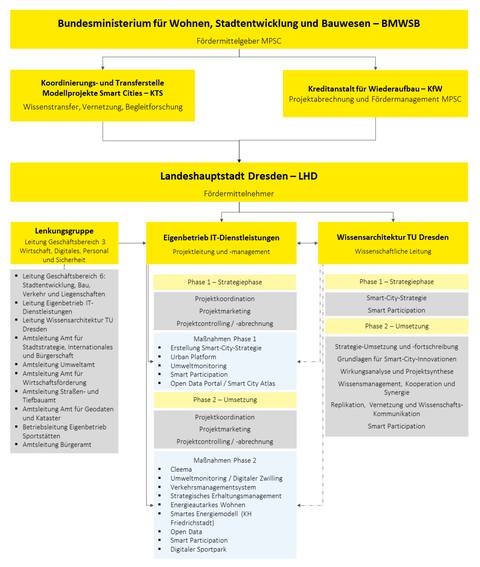What is the Model Project Smart City Dresden?
Table of contents
The "Smart City" Concept
Smart City is a collective term for digital development concepts to make cities more efficient, technologically advanced, healthier, greener and more socially inclusive. The aim is a holistic and participatory form of urban development and innovation promotion.
The focus of smart city concepts is on new or expandable technological infrastructures that solve the central problems of the digitalisation in administration, society and industry.
Competences and decisions
The development of a smart city requires the interplay of various competences and decisions. In terms of IT technology, for example, the advantages and disadvantages of in-house solutions vs. open source software, management and provision of metadata and the future development of interfaces need to be examined. In addition to the digital measures, there is the reaction of civil society, which can make development more difficult, but can also enrich it as "swarm intelligence". The unpredictable complexity requires an agile and iterative approach, which the administrative institutions must also face up to.
The Model Project Smart City Dresden puts its concept on a future-proof basis with:
- a scientifically developed smart city strategy that will be reviewed and updated during the implementation phase
- digital measures that will be tested in model districts over a defined period of time and whose "best practices" can be transfered in other districts and cities
- a constant exchange with the municipal, national and international smart city community
- Participation formats for stakeholders from civil society, politics, business and science
Smart City Measures of model project
Tools and Methods
The funding programme Model Projects Smart Cities
Model Projects Smart Cities is a funding programme by the German Federal Government. 73 Smart Cities model projects have been selected in three seasons since 2019 and will be funded with a total of 820 million euros. The participating cities receive grants amounting to 65 per cent of the project and measure costs.
In the spirit of the "Smart City Charta", the model projects should transfer the values of the European city to the age of digitalisation. Together with the entire urban society, the model projects are shaping liveable and lovable cities and regions that focus on the needs of the people.
The model projects include large cities such as Leipzig and Cologne, medium-sized cities such as Bamberg and Jena, as well as small towns and rural communities.
Website "Model projects Smart Cities" German Federal Governement
The Dresden Smart City model project
Dresden is the capital city of the German state of Saxony and 12th largest city in Germany. As a city of culture, science and high technology, Dresden offers an outstanding innovation ecosystem for creating pioneering and exemplary solutions for the (digital) city of the future that is geared towards the common good.
Years of expertise and experience
The city administration of Dresden, such as the existing "Smart City" department in the Office for Economic Development, as well as participants from science, business and civil society have already jointly pursued a wide range of smart city approaches in various contexts before applying for the model project, e.g. Zukunftsstadt or the EU-funded lighthouse project "MATchUp", both in cooperation with WISSENSARCHITEKTUR - Laboratory of Knowledge Architecture.
Dresden achieved 3rd place in the Smart City Ranking of the German industry association Bitkom in 2022.
Local Technology and process innovations
Numerous companies and scientific institutions based in Dresden create digital technology and process innovations, including
- Silicon Saxony - the largest microelectronics and semiconductor cluster in Europe with over 400 companies
- the synergetic DRESDEN-concept research alliance with the University of Excellence TU Dresden, eleven Fraunhofer Institutes, four Max Planck Society institutions, five Leibniz Institutes, the Helmholtz Centre and other universities, research and educational institutions
- the Leibnitz Institute of Ecological Urban and Regional Development (IöR)
Bringing digitalisation to Dresden's city quarters
The planning of a new administrative centre ("Stadtforum") in Dresden's city centre provided a decisive impetus for the funding application. Designed as a prototype for a digital city hall and expected to be built by 2025, it will centralise all administrative processes - particularly in the areas of construction and urban planning, transport and environmental planning.
The Model Project Smart City Dresden, in conjunction with the city forum and a fundamental digitalisation of the administration, is intended to make the opportunities of digitalisation available for urban development at a spatial level. The aim is to further develop existing innovative solutions and implement them in local neighbourhoods in such a way that "intelligent quarters" can be created in the long term in terms of higher quality of life, participation and sustainability.
Organisational structure of the Model Project Smart City Dresden
A lean and effective organisational structure was created at the beginning of the strategy phase for the implementation of the model project. This was to ensure that the project was driven forward dynamically and managed efficiently, while at the same time remaining open to creative impulses from the various groups of participants and individuals.

Organigram of the Model Project Smart City Dresden
Cooperation between administration and science
Cooperation between administration and science is essential for the pilot project. The overall project management and coordination of the measures is carried out by Dresden IT Services Organisation (EBIT). The WISSENSARCHITEKTUR - Laboratory of Knowledge Architecture at TU Dresden is responsible for scientific management.
The progress of the pilot project is monitored by a steering group, in which responsibles from administration and science report on project developments on a quarterly basis.
Participation formats
Other representatives from the city of Dresden's offices (urban planning office, mayor's office, environmental office, etc.) were consulted for expertise in strategy workshops. Stakeholders from civil society, politics, business and science are involved throughout the project via the "Smart Participation" smart city measure, which is managed by a team from WISSENSARCHITEKTUR.
Coordination and transfer centre
The "Smart Cities Model Projects" are funded by the Kreditanstalt für Wiederaufbau (KfW) on behalf of the Federal Ministry of Housing, Urban Development and Building (BMWSB). A consortium consisting of DLR, Fraunhofer, Difu, Creative Climate Cities and Prognos as well as other participants provide technical support for all model projects as coordination and transfer centre (KTS).
Smart-City-Measures in "Intelligent Quarters"
The strategy phase is followed by the implementation phase (2023-2026). The offices of the state capital of Dresden, under the leadership of the IT services organisation, have developed the following Smart City measures:
- Cleema - A digital platform should motivate Dresden citizens to adopt sustainable behaviour.
- Environmental monitoring - A digital 3D twin of Dresden is to be created, which can be used to predict more accurately extreme weather like severe storms and their effects. On the basis of the simulation buildings, for example, can be better protected .
- Traffic management system - With the help of sensors in roads and the intelligent evaluation and linking of data, cars, public transport and bicycles can be better guided along their routes, thus reducing noise, dust and traffic pollution.
- Strategic maintenance management - Instead of only recording the condition of Dresden's roads with measuring vehicles every five to six years, sensors are to provide live-information that makes it possible to recognise and repair minor problem areas before they cause major damage. Extensive roadworks and road closures can thus be avoided.
- Sector coupling in an energy self-sufficient neighbourhood - A concept is to be developed that will enable a residential neighbourhood to supply itself completely with energy and become independent of the electricity and heating grid. The energy comes from geothermal energy and photovoltaics.
-
Smart energy model - A model for a climate-neutral energy supply is to be created for the Friedrichstadt Municipal Hospital.
- Open data - is to be made available and usable for citizens, business and administration.
- Smart Participation - A concept for digital citizen participation in Dresden is to be developed and the citizen lab is to become a participatory service provider for the population and administration.
- Digital sports park - An application should enable all users such as clubs, citizens, tourists and companies to book the sports park in the Ostra-Gehege in a digital and citizen-friendly way.
The measures are being tested in 3 model districts, the so-called "Intelligent Quarters" (Friedrichsstadt, Johannstadt, Dresden East/Prohlis).
Chronology of model project
Tools and Methods
Measures on the website City of Dresden

